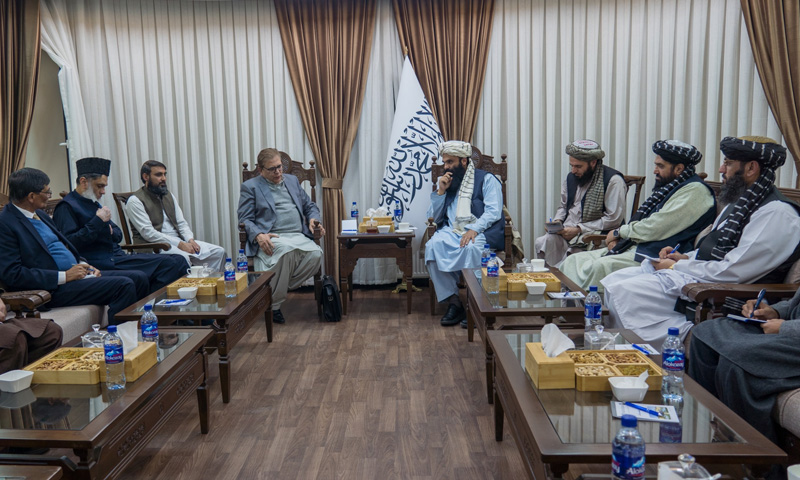- Web Desk
- Feb 19, 2026
Airstrikes may overshadow Pak-Afghan talks on mutual trust
-

- Web Desk
- Dec 29, 2024

By Tahir Khan
ISLAMABAD: Senior Afghan Taliban officials expressed a desire to remove mistrust and expand relations with Pakistan in various fields in meetings with a Pakistani delegation led by Pakistan’s Special Representative on Afghanistan Mohammad Sadiq this week, according to a statement issued in Kabul.
However, the airstrikes in Afghanistan’s Paktika province on the night of December 24 abruptly changed the environment in Kabul. This was evident in statements issued by the Afghan defence ministry and several ministers.
Pakistani officials may have valid reasons to conductairstrikes but their timing — coinciding with Ambassador Sadiq’s discussions to improve relations — raised eyebrows in Afghanistan. It seems Pakistan’s frustration at the inability of the Taliban rulers to take action against the Pakistani armed groups, which Islamabad has long been saying, operate from Afghan soil.
The Pakistani action occurred concurrently with the Pakistani delegation’s meeting with the Afghan Deputy Prime Minister Maulvi Abdul Kabir on December 24. No statement was issued after the Sadiq-Kabir meeting apparently due to the strikes.
The statements issued after Ambassador Sadiq’s meetings with the Afghan interior, foreign and commerce ministers reflected optimism for improved bilateral relations. The officials attending the meetings were very optimistic and had high expectations for positive outcomes and significant progress to be made following the discussions.
On Dec 28, the Afghan Defence Ministry claimed the Afghan Taliban forces fired into the Pakistani side were targeted in retaliation. Pakistani sources, however, said forces killed five Afghan Taliban soldiers in Paktia in response to forces in Kurram district. Instead of firing exchanges, both sides should try to calm down the situation.
Pakistan must evaluate whether such actions can effectively address the banned Tehreek-e-Taliban Pakistan (TTP) issue. The Afghan Taliban must think if they are honouring their commitments with the regional countries or world community they have made at different forums. Pakistan should have waited for the conclusion of the country’s special envoy visit. My information is the Taliban leaders explained to the Pakistani side about the complications in the issue and sought time to make progress on the issue of Pakistani groups.
Several Afghan Taliban leaders have told me that relocation of the TTP men and their families had also started from the border regions to areas far from the border so they could not have access to the border. The use of force could harm such confidence-building measures.
How Afghan leaders react to airstrikes?
Afghan Interim Foreign Minister Amir Khan Muttaqi told the Pakistani delegation on Dec 25 that his government is determined to have positive relations with Pakistan and “both should take advantage of the existing commonalities between the two nations in the political, economic and transit areas,” according to the Afghan Foreign Ministry.
But after the airstrikes, Muttaqi changed the tone. Speaking in Kabul on December 26, the Afghan Foreign Minister said “Pakistan should take a lesson from the historic resistance against the British, erstwhile Soviet Union and US-NATO forces.” Other ministers including Information Minister Mullah Khairullah Khairkhwa and Water and Power Minister Abdul Latif Mansour spoke about a possible retaliation and revenge.
What was discussed in the talks?
People privy to the Pak-Afghan discussions in Kabul told me that both sides had a road map for a follow-up and implementation process, especially some understanding of trade and economic issues. The Pakistani and Afghan sides had also reached an agreement to sign a revised Afghanistan-Pakistan Transit Trade Agreement (APTTA), which had expired years ago.
Both sides also agreed on measures like bilateral visits of political leaders and officials to boost people-to-people contacts and sign certain agreements. But now Pakistan will wait until the dust settles.
It may take some time as the anger mood still exists in Kabul. A source, who knew about the discussions in Kabul, says that the Pakistani delegation pressed the Afghan side to stop the TTP and other groups from using the Afghan soil. This discussion was in line with Pakistan’s policy. Sadiq travelled to Afghanistan a few days after TTP claimed a deadly attack on Pakistani soldiers in South Waziristan that had claimed the lives of 16 soldiers.
Sadiq’s visit to Afghanistan was an effort on the part of Pakistan to find ways to address the aggravating rift between the two countries on the way forward on bilateral interaction amid a spate of public accusations and blame game against each other.
The fact that a bilateral exchange between Islamabad and Kabul occurred after nearly a year highlights the strained relations between the two neighbours.
While this was a positive development, the real challenge for the interlocutors on both sides would be to find a space for convergence in moving forward.
Both countries remain entrenched in divergent approaches to security and counter-terrorism, particularly regarding the banned TTP and the Baloch Liberation Army (BLA), responsible for violent incidents in Pakistan.
The Afghan side argues for Pakistan to engage with the TTP fighters taking refuge in Afghanistan but wants Islamabad to facilitate the movement of people and trade and transit interaction and not link these issues due to their different nature.
The Pakistan government on the other hand is sticking to its position that the Afghan government should take action against TTP fighters based on Afghan soil so that interaction in other areas can take place smoothly.
Friction between Pakistan and Afghanistan is now seriously affecting our regional partners’ endeavours in Afghanistan particularly China and Russia. Both these countries have been urging Pakistan and Afghanistan to sort out these differences without further delay.
Another close ally of both Afghanistan and Pakistan, Saudi Arabia, has recently reopened its Embassy in Kabul, which indicates that our regional partners are now moving towards a regional approach on the normalization of Afghanistan. Pakistan needs to take advantage of this constructive trend.




